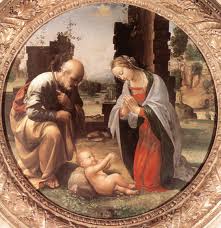
The following reflection is taken from the Sermones of Saint Anthony of Padua, published in Saint Anthony: Herald of the Good News (translated by Fr. Claude M. Jarmak OFM Conv., Conventual Franciscan Friars, Ellicott City, Maryland, 1995).

Just a Moses lifted up the serpent in the desert, so must the Son of God be lifted up, that all who believe may have eternal life in him (Jn 3:14-15).
“Just as Moses lifted up the serpent in the desert.” In the Book of Numbers, we read that God sent poisonous snakes to bite the people who had murmured against Him. Then the Lord commanded Moses: “Make a fiery serpent and mount it on a pole, and if anyone who has been bitten looks at it, he will recover” (Num 21:18). The bronze serpent symbolizes Christ, God and man. Bronze, which does not deteriorate with age, signifies Jesus’ divinity; the serpent symbolizes His humanity, which was indeed raised up on the wood of the cross as the sign of our salvation.
Let us raise our eyes and “Keep them fixed on Jesus” (Heb 12:2), the author of our redemption. Let us contemplate our Lord, pierced with nails and suspended from the Cross. But lo, as Moses says in Deuteronomy (28:66), “Your life will hang before you, and you will not believe your life?” He does not say, “living life” but “hanging life”. What is more precious that a person’s life? The life of the body is the soul, and the life of the soul is Christ. Your very life hangs from the Cross. How can you not suffer with Him? How can you not partake in His sufferings? Christ hangs from the Cross before you to invite you to share in His sufferings as written in the Lamentations: “Come, all of you who pass by the way, look and see whether there is any suffering like my suffering” (1:12).
“Your life hangs before you” on the Cross so that you might see yourself as in a mirror, examining and scrutinizing yourself in it. You can see how serious were your wounds that they could not be healed by any other medicine except by the blood of the Son of God. If you pause to reflect profoundly, you will realize how sublime is your dignity, and how excellent your worth, which demanded so high a price.
You cannot better appreciate your worth than by looking into the mirror of the Cross of Christ; there you will learn how you are to deflate your pride, how you must mortify the desires of the flesh, how you are to pray to your Father for those who persecute you, and to commend your spirit into God’s hands. But, sad to say, what happens to us is what Saint James writes: “A man who listens to God’s word but does not put it into practice, is like a man who looks into a mirror at the face he was born with; he looks at himself then goes off and promptly forgets what he looks like” (1:23-24). In the same way, we look at the Crucified and recognize the image of our redemption, but grieve little. As soon as we turn our eyes away, we divert our hearts and return to vain worldly amusements.


 That united with Christ crucified this Lent we may be renewed in our defence of the unborn.
That united with Christ crucified this Lent we may be renewed in our defence of the unborn. 